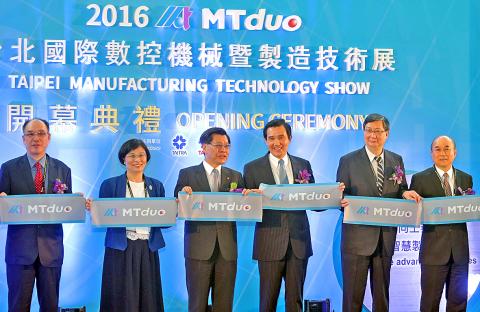The nation’s machinery makers should lead in the era of “Industry 4.0” to avoid wasting resources, the head of the Taiwan Association of Machinery Industry (TAMI, 台灣機械公會) said yesterday, adding a call for close collaboration among research institutes, academia and the government.
“The industrial end is the side that knows where the demands are,” TAMI chairman Alex Ko (柯拔希) said on the sidelines of the Taipei Manufacturing Technology Show at the Taipei World Trade Center’s Nangang Exhibition Hall.
Ko said that Taiwan has advantages in the IT industry, which machinery players could use to create new opportunities in smart manufacturing.

Photo: CNA
He said IT companies such as Delta Electronics Inc (台達電) and Advantech Co (研華) have joined the trend.
The association billed last year as the first year of “smart machinery” manufacturing and is expecting more orders of such products in the next two years, Ko said.
“We have done more than enough to promote Industry 4.0 as the main axis of the machinery industry,” Ko said, adding that now is the time to sell such products to the world.
Fatex Co (發得科技) is one of the companies taking part in the exhibition that has joined the Industry 4.0 bandwagon, Ko said.
The company’s production line is equipped with automatic virtual metrology (AVM), with many of its smart applications destined to reach the Turkish market by the end of this month and Indian customers next month, he said.
Taiwan’s machinery equipment exports fell 6.8 percent annually to US$20.1 billion (NT$620.8 million) last year, and the lackluster performance continued in the first quarter, with exports dropping 9.1 percent annually to US$4.89 billion, government data showed.
Overall, the machinery industry reported output of NT$955 billion last year, down 3 percent from a year earlier, Ko said.
However, Ko is optimistic about the industry’s outlook this year, citing more than NT$15 billion in orders received last month at a machine tool exhibition in Shanghai and a few billion New Taiwan dollars in orders collected at a plastics and rubber exhibition in Shanghai the same month.
In addition, the incoming Democratic Progressive Party administration, which is to take office on May 20, has called smart manufacturing one of the nation’s five “creative industries.”
“We hope investment by the government will go straight to the machinery industry, which would help it become the engine to drive everyone who is onboard,” Ko said.
Meanwhile, Taiwanese machine tool makers are eyeing aerospace opportunities, valued at US$5.2 trillion in business potential per year, TAMI machine tool committee chairman David Chuang (莊大立) said at a separate event.
Chuang said the industry is facing challenges from Japanese and South Korean peers in terms of less favorable tariffs and foreign-exchange rates, and therefore local companies should seek to cooperate to boost competitiveness.
In the first quarter, the nation’s machine tool exports dropped 20.7 percent annually to US$634 million due to depreciation of the yen and won against the US dollar, TAMI said.

CHIP RACE: Three years of overbroad export controls drove foreign competitors to pursue their own AI chips, and ‘cost US taxpayers billions of dollars,’ Nvidia said China has figured out the US strategy for allowing it to buy Nvidia Corp’s H200s and is rejecting the artificial intelligence (AI) chip in favor of domestically developed semiconductors, White House AI adviser David Sacks said, citing news reports. US President Donald Trump on Monday said that he would allow shipments of Nvidia’s H200 chips to China, part of an administration effort backed by Sacks to challenge Chinese tech champions such as Huawei Technologies Co (華為) by bringing US competition to their home market. On Friday, Sacks signaled that he was uncertain about whether that approach would work. “They’re rejecting our chips,” Sacks

NATIONAL SECURITY: Intel’s testing of ACM tools despite US government control ‘highlights egregious gaps in US technology protection policies,’ a former official said Chipmaker Intel Corp has tested chipmaking tools this year from a toolmaker with deep roots in China and two overseas units that were targeted by US sanctions, according to two sources with direct knowledge of the matter. Intel, which fended off calls for its CEO’s resignation from US President Donald Trump in August over his alleged ties to China, got the tools from ACM Research Inc, a Fremont, California-based producer of chipmaking equipment. Two of ACM’s units, based in Shanghai and South Korea, were among a number of firms barred last year from receiving US technology over claims they have

It is challenging to build infrastructure in much of Europe. Constrained budgets and polarized politics tend to undermine long-term projects, forcing officials to react to emergencies rather than plan for the future. Not in Austria. Today, the country is to officially open its Koralmbahn tunnel, the 5.9 billion euro (US$6.9 billion) centerpiece of a groundbreaking new railway that will eventually run from Poland’s Baltic coast to the Adriatic Sea, transforming travel within Austria and positioning the Alpine nation at the forefront of logistics in Europe. “It is Austria’s biggest socio-economic experiment in over a century,” said Eric Kirschner, an economist at Graz-based Joanneum

BUBBLE? Only a handful of companies are seeing rapid revenue growth and higher valuations, and it is not enough to call the AI trend a transformation, an analyst said Artificial intelligence (AI) is entering a more challenging phase next year as companies move beyond experimentation and begin demanding clear financial returns from a technology that has delivered big gains to only a small group of early adopters, PricewaterhouseCoopers (PwC) Taiwan said yesterday. Most organizations have been able to justify AI investments through cost recovery or modest efficiency gains, but few have achieved meaningful revenue growth or long-term competitive advantage, the consultancy said in its 2026 AI Business Predictions report. This growing performance gap is forcing executives to reconsider how AI is deployed across their organizations, it said. “Many companies